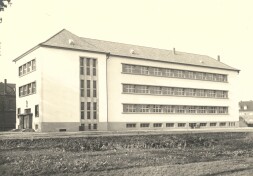
© Stadtarchiv Bocholt
The new primary school on Münsterstraße around 1930, with the old school building from 1898 on the left and a residential building on Reygersstraße on the right.City history: The new primary school on Münsterstraße
The Bocholt city archive presents the historical "photo of the month" October
In the "Photo of the Month" series, the Bocholt City Archive is this time focussing on the primary school on Münsterstraße, which provided space for teaching and learning in the first half of the 20th century. Due to the bombing of Bocholt in the Second World War, the building was only preserved for a short time.
Within ten years of the end of the First World War, the population of Bocholt grew by 28 per cent to around 33,000. 1,184 flats were built here between 1918 and 1928. There was also no shortage of new public facilities during this time, such as the post office, the Mittelstandshaus and the Kapitoltheater. In 1928/29, a monumental school building was added in the form of the Catholic school on Münsterstraße.
This new building had become necessary because the previous school building, built 30 years earlier on Münsterstraße, was no longer adequate. Many of the now 627 pupils from this district had to switch to the Altstadt and Fildeken school systems as so-called travelling classes in the 1920s. On 22 May 1928, the city council therefore approved the construction of the new " school system V" at a cost of 600,000 Reichsmarks. The plans were drawn up by the municipal building department. Excavation work began on 9 October of the same year, and after a year, on 30 October 1929, the four-storey building was finally opened to the public during a religious and secular ceremony. The basement housed the school caretaker's flat and the technical facilities. Four classrooms, each measuring 58 square metres, were set up on the three floors above. The ground floor also housed the headmaster's office, which was located near the bright entrance hall, whose leaded glass windows were decorated with fairytale motifs. A teachers' room, a photographic room, a library and a room for teaching materials were then set up on the first and first floors. In addition, a gallery for the gymnasium to be built later was already planned on the first floor.
The photo shows the new Catholic primary school on Münsterstraße, which was named "Kreuzbergschule" for the 1930 school year. The main entrance on the south side was adorned with a sculpture by the Leo Heinrichs company depicting a school pupil. The previous school building from 1898 can be recognised on the left-hand side of the picture, while a residential building on Reygersstraße can be seen on the far right. In 1945, the Kreuzberg School was completely destroyed in the bombing raid on the city. The successor building was reopened on 18 October 1952.
Text: Wolfgang Tembrink / Bocholt town archives


